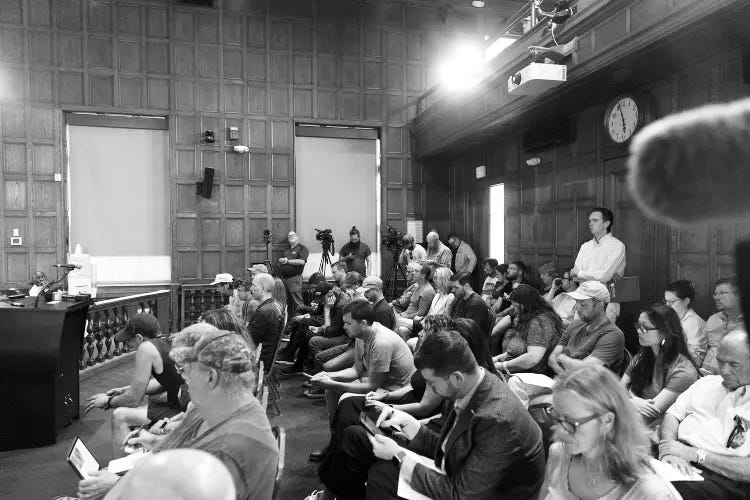Live Nation's Invasion of Portland May End Before It Begins
An new proposal in Portland, Maine may stop the live music monopolist from opening a new venue in the city.
The community-led push to keep Live Nation, one the country’s most notorious monopolists, out of Portland, Maine this week landed in the hands of city officials. But will they listen to musicians and fans? Or the most powerful company in the history of music?
Last night, Portland city officials debated a proposed ordinance that, if enacted, would effectively kill Live Nation’s attempt to open a new, 3,300-person venue in the heart of the city’s downtown. Musicians, promoters and independent venue owners in the Maine Music Alliance have driven the grassroots uprising against the live music mega-monopolist’s proposed venue, and this new ordinance represents their best shot at killing the immediate venue proposal and continuing to question whether Live Nation deserves a place in the Portland music scene at all.
If you haven’t followed the saga of Live Nation’s proposed new venue in Portland (I wrote a bit about it here), here’s the background: Last winter, Live Nation and local developers announced plans to build a new mid-sized venue a block away from City Hall and right around the corner from Merrill Auditorium — an existing, major local venue. Indie venue owners and musicians inherently knew that opening a Live Nation venue in town would mean importing the monopolist’s notorious predatory practices along with it. Live Nation is the largest concert promoter, largest artist manager, largest event ticketing company and second-largest venue owner and operator in America. It wields its monopoly control over the live music ecosystem at the expense of local, independent venues, which get shut out of crucial tours and events, particularly those by artists whom Live Nation represents. If local venues lose concerts and close, that means local musicians have fewer places to perform, promoters have fewer venues to book, and the entire local music scene suffers. No city wants that.
So the Maine Music Alliance stepped up and organized a campaign to stop the proposed venue from being built. That organizing culminated in a contentious, hours-long meeting before City Council this summer. More than 100 folks filled council chambers, most of whom spoke out against the venue and the monopoly tactics Live Nation has used to dominate live music. The city ultimately voted to put the project on hold for six months while they sorted out what to do.
Indie venue owners and musicians inherently knew that opening a Live Nation venue in town would mean importing the monopolist’s notorious predatory practices along with it.
Now, city leaders are considering two options. The first option, proposed by two city council members, would tack a 1% fee on ticket sales at the venue that would, in part, go to support the local arts scene in various ways (the developers themselves offered to pay $1 per ticket to the city — typically more than 1% on gigs that size, but anyway). But a second plan, backed by the alliance and two other city councilors, would instead change land use rules in a way that would effectively kill the the Live Nation venue where it is currently planned.
At the moment, city rules ban venues from being less than 100 feet apart; city planners found that the proposed Live Nation venue would be a tick more than 100 feet from the front door of Merrill Auditorium, allowing it to be built downtown. But the new proposed ordinance would stretch that ban to 750 feet for venues with more than a 1,000 person capacity, while eliminating any distance restriction for smaller venues. That means Live Nation would have to look outside of downtown — or skip town altogether.
We’ll see what happens when the plans eventually reach the full City Council, where it sounds like the future of Live Nation in Portland will be decided. But dozens of folks in the Portland music scene, from venue owners to regular degular music fans, have been crystal clear about what Live Nation is: a cutthroat monopolist whose abuses have earned it a federal antitrust lawsuit and near-universal scorn from fans, artists, promoters and venue owners from coast to coast — a company that has no place in the city.
The city moratorium expires in March, although it sounds like some decision will come before then. I’ll keep you posted.



